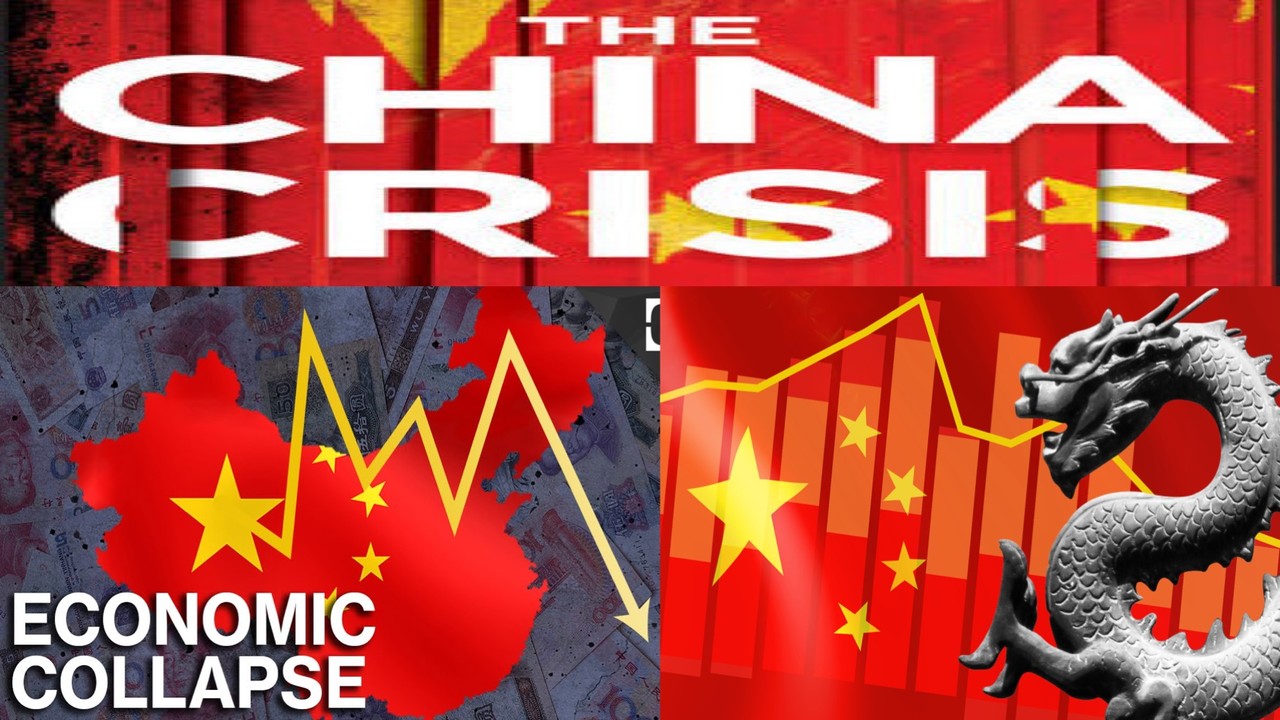1990. The Economist. China’s economy has come to a halt.
1996. The Economist. China’s economy will face a hard landing.
1998. The Economist: China’s economy entering a dangerous period of sluggish growth.
1999. Bank of Canada: Likelihood of a hard landing for the Chinese economy.
2000. Chicago Tribune: China currency move nails hard landing risk coffin.
2001. Wilbanks, Smith & Thomas: A hard landing in China.
2002. Westchester University: China Anxiously Seeks a Soft Economic Landing
2003. KWR International: How to find a soft landing if China..
2006. International Economy: Can China Achieve a Soft Landing?
2007. TIME: Is China’s Economy Overheating? Can China avoid a hard landing?
2009. Fortune: China’s hard landing . China must find a way to recover.
2011. Business Insider: A Chinese Hard Landing May Be Closer Than You Think
2012: American Interest: Dismal Economic News from China: A Hard Landing
2014. CNBC: A hard landing in China .
2015 . Forbes: Congratulations, You Got Yourself A Chinese Hard Landing ….
2017. Market Watch: China’s economic problems will come to a head in 2017
2018. CNN: Forget the trade war, China’s economy has other big problems
Concerns about Chinese economy in western media are not new, but is this all about selling to your audience what they want to hear or are there any real concerns here?
Let’s find out.
I’d like to break down this analysis into seven major parts. I’ll specify the concerns raised about Chinese economy and then try to address them one-by-one to see which could cause a potential problem – perhaps a crisis – in near future.

Increasing debt-to-gdp ratio after 2008 financial crisis
China has a debt to GDP ratio of about 250% – highest for any of the emerging economies. However, debt alone shouldn’t be the sole concern. What matters more here is its composition. Most financial crises stemmed from high amount of foreign debt and unbearable debt service ratio. China in this regard has low external debt and high foreign reserve (>$3T) to counter any unprecedented situation.

US dollar denominated debt
There is a rising concern about China’s growing dollar denominated debt. Current number stands at a staggering $1.7 T. However, that number doesn’t look scary, if you compare it with China’s overall GDP a whopping $13T i.e. foreign debt consist of about less than 12% of GDP.

If you compare China’s situation with some of the past foreign debt stemmed crises, China is in a much healthier condition. Famous investor Ray Dalio’s latest book, Big Debt Crisis, does a great job at summarizing this. For example, Malaysia in 1980s (foreign debt was 40% of GDP), Argentina in early 1990s (foreign debt was 39% of GDP), Brazil in early 1990s (foreign debt was 29% of GDP), Turkey again in early 1990s (foreign debt was 26% of GDP), Mexico in early 2000s (25% of GDP). Moreover, China’s foreign exchange reserve as mentioned previously is a good cushion against any major downturn. Concerns against any devaluation in currency, for example, Thai Baht in 1997 can also be ruled out since Yuan was successfully deregulated by Communist Party in 2016 with relatively milder repercussions.
There are still concerns about the growth rate of dollar denominated debt in recent years which was 14% in 2018 and 37% since 2017. That said, China is perhaps amongst the only major economy to have a budget surplus of $600 B, and with low interest rate on US treasuries, China is perhaps doing the right thing by fueling its ambitious projects – One Belt One Road and construction of Thai canal to reduce its dependency on Malacca strait, which if blocked, can cause serious interruption in exporting Chinese goods.
Shadow Banks
Shadow banking’s rise in China is an increasingly concerning problem highlighted by economists. China’s opaque measures and little to no regulation in these sectors makes it more worrisome. About half of China’s economy is tied up to its shadow banking systems. However, to put things in perspective, if you compare the latest numbers published by Financial Stability Board (FSB), numbers are much worse for the United States at 142% of GDP and Euro Zone at 178%.

Moreover, China only constitutes 10% of global shadow banking assets whereas US – 27% and EU – 32%. Another interesting aspect from the report is interconnectedness of services such as asset management products offered by Chinese shadow banks. According to the same FSB report, China’s shadow banking system had least interconnectedness to the rest of the world. This clearly indicates even if things go bad it will be contained within Chinese border, reducing chances of Minsky moment.
Ghost towns
China’s property prices have rapidly increased since 2005, growing more than five folds in just 10 years. Rising prices coupled with rapid constructions led many economists and journalists to believe it could potentially trigger next financial crisis.

While these are valid concerns, and we might see some cool-off and price correction in real-estate market in near future, it is far from triggering a crisis. Why? Two things:
1. Immigration to coasts: China has seen unprecedented migration to coastal cities in recent past. As living standards rise, more and more people are migrating to cities, which poses a huge infrastructure challenge. Communist party has big task in front to stop that migration and provide people with jobs nearby their hometowns. Additionally, Chinese conservative investors have always been investing in real-estate as their top investment priority as compared to western nations where people tend to have more inclination towards stock markets. So, we might see a small swing in prices, but chances of crisis are less probable.
2. Incentives from Chinese government: Communist party has unprecedented power when it comes to providing tax-breaks and other financial incentives for business to migrate to uninhabited ghost towns. Once incentives are announced, local companies will flock to take advantage and, hopefully, things will be hunky-dory again for real-estate firms.
High debt service ratio
At the moment, China’s debt service ratio is about 20% of GDP, which may characterize as high by some economists, but again looking back at some of the past financial crises, it looks manageable. Additionally, most of the loans have been made by State owned Banks to State owned Enterprises (SOE), which gives China immense restructuring flexibility and ability to extend the repayment time of debt.

Concerns of hard landing
Xi Jinping’s crackdown on Chinese corruption in recent years has had significant impact on slowing down the economy. People are spending less on luxury products, which were mostly used to bribe government officials. Slowing export and excess production capacity is also a major concern for Chinese economy. This coupled with tariff war with the US led many economists to believe Chinese economy could have a hard landing. However, with consumer savings still at about 50%, consumers are still in a strong position to increase spending, and ever-growing number of people are getting connected to mainstream financial services. This will not only increase liquidity but also have significant positive impact on banks’ balance sheets that could help China make transition from export and credit lead growth to domestic spending based growth.

Wait, but what about Black Swans?
Given the numerous challenges already facing China, it is no small wonder that its economy has not already collapsed. While it is hard to conclude anything about Black Swans, Communist party has both the political will and plethora of tools in its repertoire to come up with creative solutions. For instance, in 2004, Chinese government bailed out two banks with injection of $45 billion cash and restructuring loans. With tight grip on the banking system and majority control over SOE, Chinese have much more resilience and power to curb domino effect that caused 2008 financial crisis in the US after collapse of Lehmann Brothers.
Ramification on US fixed income market
In the horizon of 9-12 months, I don’t see any significant impact on US fixed income market. That said, Chinese government might still increase their dollar denominated debt because of relatively low federal rates, however, if that changes Chinese corporates and government both would need to take a deeper look on their debt servicing ratio. This year, I do expect feds to increase rate at least once (perhaps in the later half) that could potentially slow down Chinese economy and increase interest payments.
In conclusion, though prima-facie concerns about Chinese economy look appalling, based on my research and data analysis, I don’t see any imminent threat of financial crisis emanating from China. That said, there are deep economic concerns that communist party still need to address. With unparalleled grip on financial sector in the country, I hope China can pull off “beautiful deleveraging” as popularized by billionaire hedge fund investor and founder of Bridgewater, Mr. Ray Dalio. The sooner the better.https://www.linkedin.com/embeds/publishingEmbed.html?articleId=7511145058767327194
Xi Jinping has clearly stated “financial stability of country is my top priority”, and I wouldn’t be surprised, if Chinese government intervene and bail out a few more banks in slightest of sign of economic downturn.

For communist party, financial instability has far reaching impact in terms of political unrest and perhaps change in power. Would Communist Party risk ceding the very power that makes it supreme and give it elite status in the country? I doubt it.
Get freshly brewed hot takes on Product and Investing directly to your inbox!

